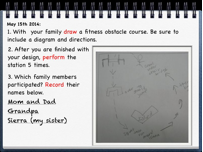Celebrate Student Learning with SPELL!
Ashleigh Evaniew, Brent Bradford, & Clive Hickson, University of Alberta
There are several 'tools available for our tool belts' as teachers of physical education when it comes to quality assessment procedures. In this article, we would like to SPELL one out for you!
Assessing student learning is a vital component of the teaching process and can act as a way to celebrate student achievement. Surveys, checklists, rubrics, rating scales, e-portfolios, etc., are just a few examples of possible assessment instruments to demonstrate and assess academic growth.
To begin, let's examine two key considerations: (1) Celebrating student learning progress, and (2) tools for assessing student learning.
(1) Celebrating Learning Progress in Physical Education
Celebrating student progress is most effective when it's done in a meaningful and genuine way that motivates students to continue learning. In other subject areas (e.g., reading, writing, mathematics), students are consistently praised and provided with positive feedback on their progress. For example, when students progress to higher reading levels the achievement is noted and usually celebrated.
This same celebratory attitude and attention needs to extend to all subject areas including Physical Education. If students are to become "physically educated" we must always be mindful of student learning (Hickson, 2003). In short we need to:
- Plan learning!
- Assess learning!
- Celebrate learning!
(2) Assessment Tools in Physical Education
Assessment can be measured against pre-set goals, student-set goals, curricular standards, etc. Assessment is the way to demonstrate student progress and whether or not celebrating learner achievement is warranted.
As an example, consider the skill of throwing. Learning logs, in which students describe what part of the throw has been improving and perhaps even include photos as evidence of learning, can help to identify whether students are developing more effective throwing patterns, However, as effective as learning logs can be, for some reason regular learning logs are rarely used for more than a small portion of the school year (e.g., beginning of the year) or even only for one or two units of study (e.g. basketball, cross-country running). It's no surprise then that learning logs can easily become a forgotten part of student assessment as the months go by.
Learning logs should be an assessment tool that are designed specifically to support continuous, collaborative, comprehensive and criteria-driven measurements of learning, which include teacher, peer and student input. The new type of learning log we will be explaining in the following sections is called the "Student Physical Education Learning Log" (SPELL).
SPELL (Student Physical Education Learning Log)
 SPELL is designed to be as a tool to enhance and record student learning in physical education in an ongoing process that includes depth, breadth, and variety. Similar to an academic portfolio showcasing writing progress, SPELLs are continuous, collaborative, comprehensive, and criteria-driven records of student learning intended to be built upon year after year unlike the regular learning logs discussed previously. Additionally, unique to SPELLs are that they concentrate on learning in Physical Education. As a primarily "physical" subject generally removed from traditional "pencil and paper" subject work, physical educators often have very little "evidence" to demonstrate to families, teachers and students themselves of the progress being achieved. SPELL is designed to be as a tool to enhance and record student learning in physical education in an ongoing process that includes depth, breadth, and variety. Similar to an academic portfolio showcasing writing progress, SPELLs are continuous, collaborative, comprehensive, and criteria-driven records of student learning intended to be built upon year after year unlike the regular learning logs discussed previously. Additionally, unique to SPELLs are that they concentrate on learning in Physical Education. As a primarily "physical" subject generally removed from traditional "pencil and paper" subject work, physical educators often have very little "evidence" to demonstrate to families, teachers and students themselves of the progress being achieved.
Having a SPELL solves this limitation whilst focusing on the ongoing learning process.

Teachers can use SPELLs when comparing progress to curricular standards.
Students can use SPELLs to appreciate and record their accomplishments.
Families can use SPELLs to understand their child's learning.
Teachers, students and families can use SPELLs to "celebrate" student learning in Physical Education
SPELLS can be displayed and explained as part of
"Demonstration of Learning" evenings!
Student Ownership
It is hoped, that through the prompted activities listed below, that students will recognize their own progress through ongoing record keeping, leading them to obtain a sense of ownership and accountability to further their learning. The specifics of the appearance and use of SPELLs can of course vary according to the age and developmental level of students. Following a general outline of a SPELL we provide a list of prompts used to inspire and record student learning.
Not an Activity Book
SPELLs are not simply a list of physical activities to participate in, or a record of minutes walked, kilometers ran, or repetitions completed. Such records of inventory are important and may be included as a few SPELL activities; however, SPELLs can be much more. SPELLs involve teachers, students and peers recording their thoughts, ideas, and opinions on the ongoing student learning in physical education. A dedicated journal, computer file, 3-ring notebook (that can be added to), or similar should be used to store this information and be accessible to share later when communicating learning achievements.
SPELLs can become assessment tools that are passed on from year to year as students enhance their skills, knowledge and attitudes in Physical Education.
Below are a few suggestions to consider when planning SPELL time:
Beginning of Class: Something that could focus student learning for the lesson:
- Write down two ways that you will show attentive listening today in PE and explain briefly why paying attention is important in physical education.
End of Class: A way to reflect on the learning that occurred during a lesson:
- Write down three sentences about what you learned in physical education class today. Explain briefly how your partner improved during the lesson as well.
Daily: A short simple prompt that can be answered in a relatively quick period of time:
- Name three classmates who you cooperated with during the lesson and explain briefly how your cooperative skills enhanced your learning.
Weekly/Monthly: Complex activities that require more research and thought:
- This month we studied traditional German dances. Create a poster that illustrates your understanding.
Homework: Take home activities to further extend student learning or purposely communicate learning with family members:
- Create a playbook from your favorite sport!
Possible SPELL Prompts: Listed below (in no particular order) are possible prompts that can be used in SPELLs. Teachers should choose words and activities to suit content and best serve their students' learning needs.
- Circle the types of balls you bounced in class
- Draw your favorite yoga pose
- Draw your least favorite yoga pose
- Label the tennis equipment
- Count and record how many jumping jacks you performed
- Relate alternative environment activities to the weather forecast
- Diagram a strategic hockey play and explain its purpose
- Graph your heart rate results over the course of three months
- Explain why safety must be a focus in Physical Education class
- Defend why you chose to use a large ball when partner passing
- Infer the shortest pathway to a predetermined location
- Provide examples of local running trails
- Predict where the object will travel based on the bounce
 - Demonstrate three partner balances
- Prepare a Warm-up presentation
- Break down a golf swing
- Combine four loco motor movements
- List three gymnasium safety rules
- Categorize teamwork skills
- Appraise a peer’s overhand throw
- Choreograph an original line dance
- Plan an 10 minute aerobics lesson
- Explain a 4-4-2 soccer formation
- Evaluate your family’s healthy lifestyle
- Determine shot percentages in basketball
- Compose a plan to be physically active five ways next month
- Propose a Physical Education field trip and list five ways it can benefit your learning
- Assess the communication skills among your group
- Compare and contrast Warm-ups and Cool-downs
- Critique your food choices over the course of one week
- Justify the importance of Quality Daily Physical Education
- Write a description about the gains you've made health-wise over the last four weeks
- Analyze a peer's Cool-down presentation
Conclusion
Assessment in Physical Education is a vital component in student learning. There are several tools that can assist in the assessment of learner achievement. SPELLs are one such tool. By providing students with continuous, collaborative, comprehensive and criteria-driven assessment opportunities to record their thoughts, ideas, facts, etc., about their physical education learning in a dedicated journal, computer file, or notebook can become an effective way to help students "celebrate" their ongoing learning.
After all, ongoing student learning in Physical Education should be celebrated!
References
Hickson, C. (2003). Putting education back into P.E. International Journal of Learning. 10.
Biographies:
Ashleigh Evaniew, M.Ed. is currently a schoolteacher specializing in elementary physical education in Edmonton, Alberta. Her teaching experience ranges from early childhood education to instructing at the post secondary level. In 2012, she received the Faculty of Education's Graduate Teaching Award from the University of Alberta. She can be contacted at aevaniew@ualberta.ca.
Brent Bradford, a Doctoral (PhD) Candidate at the University of Alberta, has worked as a Physical Education Teacher Educator for the past five years. In 2011, he was selected as the Faculty of Education's Graduate Student Teaching Award recipient. Brent spent 10 years teaching and coaching with the Edmonton Catholic School Division in both the elementary and junior high school environment prior to returning to the University. Brent can be reached at bdb3@ualberta.ca.
Clive Hickson: A regular pelinks4u contributor. Please read his biography on the pelinks4u 'contributors' page.
(back
to pelinks4u homepage) |







 SPELL is designed to be as a tool to enhance and record student learning in physical education in an ongoing process that includes depth, breadth, and variety. Similar to an academic portfolio showcasing writing progress, SPELLs are continuous, collaborative, comprehensive, and criteria-driven records of student learning intended to be built upon year after year unlike the regular learning logs discussed previously. Additionally, unique to SPELLs are that they concentrate on learning in Physical Education. As a primarily "physical" subject generally removed from traditional "pencil and paper" subject work, physical educators often have very little "evidence" to demonstrate to families, teachers and students themselves of the progress being achieved.
SPELL is designed to be as a tool to enhance and record student learning in physical education in an ongoing process that includes depth, breadth, and variety. Similar to an academic portfolio showcasing writing progress, SPELLs are continuous, collaborative, comprehensive, and criteria-driven records of student learning intended to be built upon year after year unlike the regular learning logs discussed previously. Additionally, unique to SPELLs are that they concentrate on learning in Physical Education. As a primarily "physical" subject generally removed from traditional "pencil and paper" subject work, physical educators often have very little "evidence" to demonstrate to families, teachers and students themselves of the progress being achieved. 
